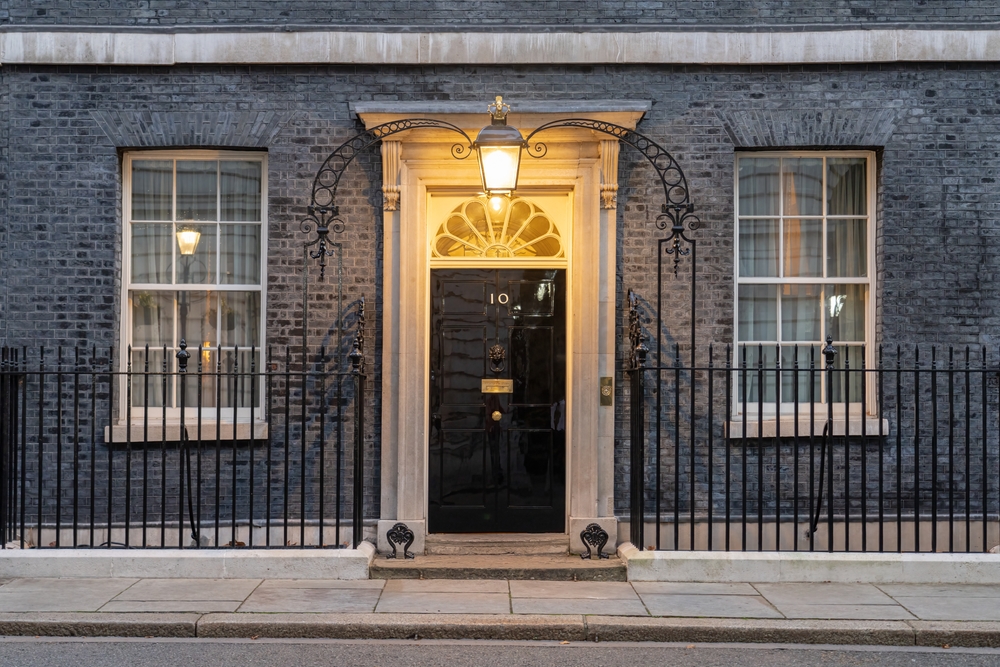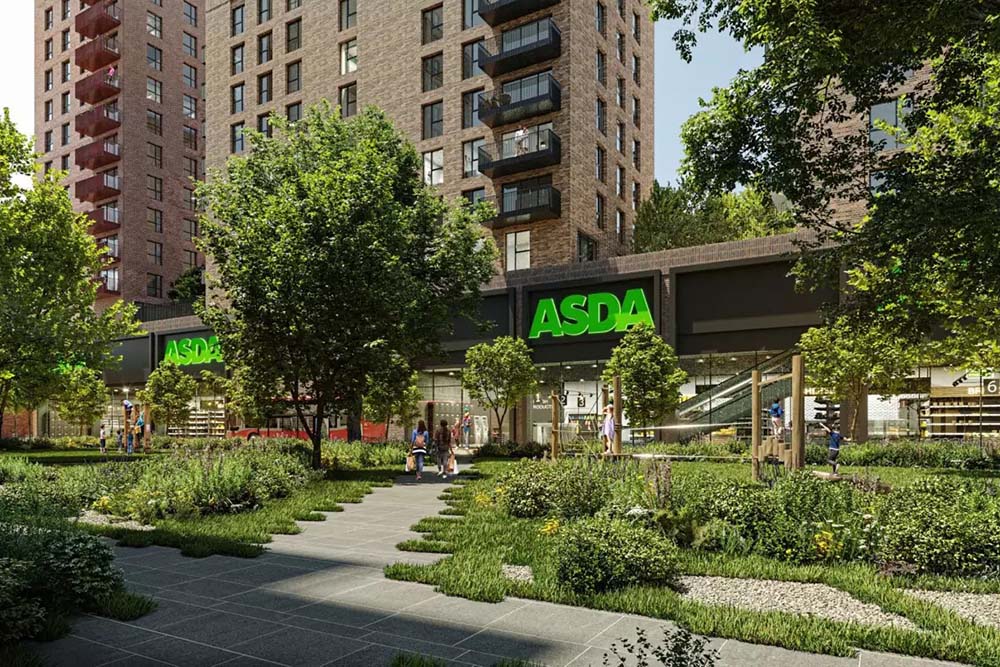
by Kim Pidgeon | Jul 26, 2024 | News
The plans include restoring historical elements while sympathetically adding new buildings
Latimer – the development arm of housing association Clarion Housing Group – has got the go-ahead for the redevelopment of the former London Chest Hospital site in Bethnal Green.
The London Borough of Tower Hamlets’ planning committee approved the proposals, which aim to transform the disused site into a community of 274 new homes.
Latimer has committed to delivering 50% affordable housing within the new development, with 76 homes allocated for social rent.
The approved plans have been designed by architects from Allford Hall Monaghan Morris (AHMM) and focus on both preserving and restoring the site’s historical elements.
The refurbishment will include the Grade II-listed main hospital building, the Sanitary Tower, and the South Wing. In addition, five new buildings ranging from five to nine storeys will be constructed.
The project also includes 125 square metres of non-residential space for use by the local community and the commitment to preserve the veteran Mulberry tree, one of east London’s most cherished natural landmarks. The approved proposal ensures the tree remains in its original location.
Richard Cook, group director of development at Clarion, said: “We are delighted to receive approval for our redevelopment plans for the London Chest Hospital site. This project represents a unique opportunity to blend the historical significance of the site with local housing needs.
“Our commitment to providing a high proportion of affordable homes and preserving the Mulberry tree reflects our dedication to creating sustainable and inclusive communities for local residents.”
Paul Monaghan, executive director of Allford Hall Monaghan Morris said: “We are very pleased that Tower Hamlets planning committee has voted to approve the proposals. AHMM’s design aims to sensitively restore the disused Grade II listed former London Chest Hospital and secure its long-term future. Working with Clarion, our proposals will deliver much needed affordable homes for Tower Hamlets and for London.”

by Kim Pidgeon | Jul 9, 2024 | News
Labour Prime Minister Keir Starmer’s new cabinet get to work…
Following the Labour Party’s landslide victory, new Prime Minister Keir Starmer has named his cabinet, appointing Angela Rayner as Deputy PM and Rachel Reeves as the UK’s first female Chancellor of the Exchequer.
Yvette Cooper is the new Home Secretary, David Lammy – Foreign Secretary, Wes Streeting – Health Secretary, Shabana Mahmood – Secretary of State for Justice and Ed Miliband – Secretary of State for Energy Security and Net Zero. The full cabinet can be found here.
Rayner, who was elected as the MP for Ashton-under-Lyne in May 2015, also takes on the role of Secretary of State for Levelling Up, Housing and Communities.
In her first speech as Chancellor, Rachel Reeves, promised to take immediate action to fix the foundations of the economy, rebuild Britain and make every part of the country better off.
Reeves addressed the economic inheritance the new government faces and committed to taking immediate action to drive sustained economic growth.
Setting out her first steps to deliver on the government’s commitments in its manifesto, the Chancellor promised a new economic model that will grow the economy and keep taxes, inflation and mortgages as low as possible.
The Chancellor said had the UK economy grown at the average rate of OECD economies over the fourteen years from 2010, it would be £143.3 billion larger – worth £5,053 for every household in the country. This could have brought in an additional £58 billion in tax revenues in the last year alone to sustain our public services.
Reeves went on to announce a series of measures, including taking urgent steps to build 1.5 million homes over the next five years and the immediate removal of the de facto ban on onshore wind in England, as part of its clean energy mission.
“Over the weekend, I met with the Prime Minister and the Deputy Prime Minister to agree the urgent action needed to fix our planning system.
“Today, alongside the Deputy Prime Minister, I am taking immediate action to deliver this government’s mission to kickstart economic growth;
“And to take the urgent steps necessary to build the infrastructure that we need, including one and a half million homes over the next five years.
“The system needs a new signal. This is that signal.
“First, we will reform the National Planning Policy Framework, consulting on a new growth-focused approach to the planning system before the end of the month, including restoring mandatory housing targets.
“And, as of today, we are ending the absurd ban on new onshore wind in England. We will also go further and consult on bringing onshore wind back into the Nationally Significant Infrastructure Projects regime, meaning decisions on large developments will be taken nationally not locally.
“Second, we will give priority to energy projects in the system to ensure they make swift progress… and we will build on the spatial plan for energy by expanding this to other infrastructure sectors.
“Third, we will create a new taskforce to accelerate stalled housing sites in our country…beginning with Liverpool Central Docks, Worcester Parkway, Northstowe and Langley Sutton Coldfield, representing more than 14,000 homes.
“Fourth, we will also support local authorities with 300 additional planning officers across the country.
“Fifth, if we are to put growth at the centre of our planning system, that means changes not only to the system itself, but to the way that ministers use our powers for direct intervention.
“The Deputy Prime Minister has said that when she intervenes in the economic planning system, the benefit of development will be a central consideration and that she will not hesitate to review an application where the potential gain for the regional and national economies warrant it and I welcome her decision to recover two planning appeals already, for data centres in Buckinghamshire and in Hertfordshire.
“To facilitate this new approach, the Deputy Prime Minister will also write to local mayors and the Office for Investment to ensure that any investment opportunity with important planning considerations that comes across their desks is brought to her attention and also to mine.
“The Deputy Prime Minister will also write to Local Planning Authorities alongside the National Planning Policy Framework consultation, making clear what will now be expected of them including universal coverage of local plans, and reviews of greenbelt boundaries. These will prioritise Brownfield and grey belt land for development to meet housing targets where needed.
“And our golden rules will make sure the development this frees up will allow us to deliver thousands of the affordable homes too, including more for social rent.
“Sixth, as well as unlocking new housing, we will also reform the planning system to deliver the infrastructure that our country needs.”
Deputy Prime Minister Angela Rayner said: “Our country is under new management and a new era for economic growth will be built on secure foundations.
“The Chancellor and I will work in lockstep to kickstart the economy, unleashing housebuilding and powering local growth.
“Change starts now. We will unblock the bottlenecks and drive forward a transformational package to build the homes people need.”

by Kim Pidgeon | Jun 30, 2024 | News
The housing association releases full-year unaudited results
Peabody Group invested £374m into their existing stock during the year, and plan to spend around £2bn over five years.
The not-for-profit housing association, which has 107,000 homes across London and the Home Counties, has released their unaudited results ahead of its Annual Report.
The £374m spend on existing homes includes investing £135m in improving the condition and environmental performance of residents’ homes. Almost 80 percent of which are now EPC C rated following further upgrades. A further £64m on fire safety as remediation work progresses. £175m went on planned maintenance and responsive repairs.
This is the housing association’s second year of trading incorporating Catalyst Housing Limited and its subsidiaries as part of the Peabody Group. It’s the first year of trading following the transfer of engagements of Catalyst Housing Limited into Peabody Trust and Rosebery Housing Association Limited into Town & Country Housing.
Ian McDermott, Peabody chief executive said: “This has been a year of good progress, but we know there is much work to do. We’re transforming our services and investing in homes and sustainable places for the long-term.
“Our local focus and commitment to getting the basics right remains a strategic priority. Our plan is to spend around £2bn over five years – or around £1m a day – on improving and maintaining residents’ homes. This is the right thing to do and will bring material benefits. Over time it will help to reduce the volume of responsive repairs and complaints and improve residents’ satisfaction with our landlord services.
“We also want to support local government in tackling London’s homelessness emergency by providing new social homes where we can. New homes of all tenures are essential infrastructure for the country, and we’ll continue to work with public and private partners on regeneration and new supply. All this activity clearly puts pressure on financial metrics, but we remain determined to use our balance sheet and liquidity as well as exploring new, innovative ways to invest in the things that support our goal of helping people flourish.”
Peabody invested £553m in its new homes programme over the last 12 months, completing 1,381 new homes.
The tenure mix is:
- Social rent: 322
- London Affordable rent: 313
- Affordable rent: 91
- Intermediate Market Rent: 16
- Shared Ownership: 478
- Market Sale: 161
The housing association, which made 1,157 starts on site during the year, says it’s “carefully managing” their development programme, “maintaining appropriate flexibility on the level of future spend and commitments which has limited the extent of expected write downs to around £10m in the period.”
The report states Peabody’s access to liquidity remains very strong with almost £1.3bn of cash and undrawn facilities. In addition they have continued to improve liquidity post year end with an additional £150m in bank facility.
Peabody’s balance sheet remains strong, with fixed assets of over £11bn and gearing at around 40 percent. Their turnover for 2023-24 was £992m. Turnover from core operations increased to £855m, including £774m from social housing lettings.
Overall revenues reduced due to a planned lower level of sales in the year (£130m) plus £7m other development income. A further £30m of contracted sales were anticipated but these have carried over to Q1 2024-25 due to delays on-site. Sales margins in 2023-24 improved to 12 percent, up from 10 percent previously.
Despite the significant cost pressures experienced throughout the year, and a challenging operating environment, Peabody expect their overall operating margin to be at a level similar to last year (23 percent).
Their social housing operating margin will be lower than the prior year, with their low rents below target/regulated levels. The average Peabody rent is now £138 per week and their rent collection for the year was 99.4 percent, improving as the year progressed.
Financing costs, excluding break costs incurred, increased to £170m. This reflects the full year impact of increased interest rates but, as the report states, was within their budget for the year and has allowed Peabody to maintain a healthy level of headroom over their banking covenant, whilst continuing to invest substantially in residents’ homes, in line with their commitment to spend £2bn on existing homes over five years.
In conclusion, the report says the results demonstrate that whilst facing a challenging environment, Peabody is in a strong, financially resilient position to support significant further investment for the long term.

by Kim Pidgeon | Jun 12, 2024 | News
The organisation has calculated the economic and social contributions made by social housing
The UK’s housing crisis has seen building starts rapidly decline while waiting lists for social housing soar. In London alone, over 320,000 households are awaiting social tenancies.
New research has calculated that providing social housing for households on London’s waiting list would inject at least an additional £7.7 billion a year into the UK’s economy.
The G15, which represents London’s largest not-for-profit housing associations, has conducted research focusing on the whole of London which quantifies the economic and social contributions made by social housing using Hyde and Sonnet Impact’s Value of a Social Tenancy (VoST) model. These contributions range from rent savings to the value of increased job and education opportunities, crime reduction and savings to the NHS.
In London, housing associations currently provide 289,000 social rent homes. The findings reveal that each of these homes contributes an average of at least £23,777 in value annually, totalling over £6.86 billion every year.
Providing new social tenancies for the 323,800 households on the capital’s social housing waiting list would inject at least an additional £7.7 billion a year into London and the UK’s economy.
The G15 says the housing crisis has left not-for-profit housing associations unable to invest in the new homes so desperately needed while also investing in existing stock to ensure standards meet the needs of residents and Government.
With the construction of new homes grinding to a halt, the real value of London’s social homes is being missed.
“We’re a nation obsessed by house prices but few people and even fewer politicians appreciate the real value created by London’s social homes’, says G15 Chair Fiona Fletcher-Smith.
“Political parties would do well to remember, as they write their manifestos, that London is built on a vibrant mix of people from all walks of life. Providing homes for those that need them most is an asset, not a cost, creating all kinds of social and economic benefits.”
There are 655,000 social rent homes in London, almost half of which (44%) are provided by housing associations.
The study looks at the social value of providing social housing, including higher employment, crime reduction, education and benefits to the NHS.
Building across the country is in a steep decline, with housing associations starting work on just 6,990 homes in the second half of 2023, compared with 16,270 the previous year. And in London, G15 data shows their members are expected to start work on 1,769 affordable homes in London this year, down from 7,363 last year.
Role of Housing Associations
Housing associations are not-for-profit organisations set up to support people in housing need with homes at below-market rent. All the money they make is reinvested into building more affordable homes and delivering services for their residents.
The services provided are increasingly relied upon by residents, and range from domestic violence refuges, homeless hostels through to community centres and training and apprenticeships programmes.
All areas have seen dramatic cuts from local authorities in recent years, putting even greater pressure on the housing associations.
Three-quarters of the £400,000 cost of a new home is covered by housing associations, with borrowing against current and future rental income making up a large slice.
However, the G15 says decisions by Housing Ministers on how rental income is calculated have made it increasingly difficult for associations to secure the long-term investment they need to build and also undertake refurbishment programmes on existing homes to ensure building safety and achieving net zero requirements by 2050.
It also states, the Government’s 7% rent cap coupled with inflation and interest rates is the final nail in the coffin, forcing housing associations to drastically cut back on building despite the housing crisis.
“Time has run out for the current government to get its own house in order when it comes to social housing,” said Fletcher-Smith.
“Whoever forms the next Government could immediately begin to address the housing crisis by applying consistency to areas like the rent settlement. This simple act would give housing associations the financial certainty we need to keep borrowing and investing in Londoners and the UK.
“Despite the valuable contributions that social homes make, successive Conservative Governments’ indecision means there is little room to grow for housing associations, their residents and London.
“Housing associations provide almost half of London’s existing affordable homes and are the engine of potential new homes. A few tweaks by the next Government, at no cost to them, will help us get on with the job of maintaining existing and building new homes, all while helping revitalise and regenerate communities, address stigma and providing a springboard for people into education and employment.”

by Kim Pidgeon | May 30, 2024 | News
Housing association launches Nature Recovery Strategy for both new homes and existing neighbourhoods
Clarion Housing Group has set out their plan for tackling climate change and biodiversity loss with a new blueprint for recovering nature, increasing community well-being and facilitating environmental stability.
Miles Lewis, director of sustainability at the housing association, launched the Group’s Nature Recovery Strategy by explaining: “[It] represents a comprehensive approach to enhancing biodiversity, improving community well-being, and building climate resilience across our developments and existing neighbourhoods.
“As we confront the dual crises of climate change and biodiversity loss, Clarion is dedicated to pursuing activities that not only recover nature but also support our broader climate and sustainability goals.”
Lewis outlined the three key focus areas for delivering the sustainability strategy:
- Biodiversity & nature: We aim for a measurable biodiversity net gain (BNG) above the mandatory levels for all new development projects, aspiring for 20%. For our existing neighbourhoods, our goal is a 10% voluntary BNG uplift on up to five communities each year.
- Well-being & placemaking: Our initiatives are designed to enhance the physical and mental well-being of our residents by providing increased access to high-quality green spaces. This promotes community cohesion and supports healthier lifestyles.
- Climate resilience: By integrating nature-based solutions in our designs, we enhance ecosystem services that mitigate the effects of climate change, contributing to greater environmental stability around our properties.
The strategy includes specific ‘Nature Actions’ to ensure both new developments and existing homes and neighbourhoods contribute positively to local biodiversity.
The housing association used their Clarion Index, Clarion Voice and nature focus group to shape the strategy around residents concerns and desires for the practicalities of enabling nature recovery across Clarion’s homes and neighbourhoods.
Results include:
- 70% of Clarion residents think climate change is important to them personally (Clarion Index, 2023)
- 75% of those surveyed showed positive attitudes towards nature recovery (Clarion Voice, 2024)
- The main concerns around any approach to nature recovery are linked to maintenance (70%) and potential messiness (55%) as well as raising concerns around financial implications if green space improvements
Clarion says it aspires to deliver nature improvements through changes to management and maintenance regimes and to deliver enhancements which will not financially impact residents.
***
In other Clarion news, Birmingham City Council’s planning committee has granted approval for the development of new homes in Digbeth by Latimer, the development arm of Clarion Housing Group.
The development of the Clyde Street site in Digbeth will deliver 481 new homes, of which 55% will be affordable housing through shared ownership and social rent.

by Kim Pidgeon | May 15, 2024 | News
The supermarket chain will use the land for both a new store and housing…
Asda is aiming to transform the land of its Park Royal store in north west London into a new mixed-use development.
The retailer is partnering with property developer Barratt London on the redevelopment of the brownfield site, which is currently home to its Park Royal superstore.
The plans, which Asda have unveiled for the ten-acre plot, will feature a new 60,000 square foot flagship Asda Superstore and up to 400 car parking spaces for customers. In addition, 1500 new homes are planned, 500 of which will be provided as affordable.
A large number of the apartments will utilise a landscaped podium above the new store.
The proposal, which is subject to planning approval, includes creating a new town centre for the local community, at the heart of the Old Oak and Park Royal Development Corporation major regeneration area.
The use of public transport will be encouraged at the proposed car free residential development, while the Asda car park will include EV parking spaces.
This mixed-use redevelopment of an established store site is a first for Asda and represents one of the largest land deals of the last couple of years.
The planned building work would allow for Asda’s existing Park Royal Superstore to remain open whilst work is carried out on the new store development.
Ian Lawrence, head of mixed-use developments at Asda, said: “Asda’s venture into mixed-use property redevelopment marks a significant milestone for the business. By working with leading developers like Barratt London, we are able to maximise the full potential of our property portfolio for the first time.”
“This allows us the opportunity to better serve local communities like Park Royal, with a new flagship store fit for the future, whilst creating windfall sites for housing delivery.
“We are also unlocking further opportunities to release value from our extensive property portfolio, which can be reinvested back into the business to fund other initiatives and support our long-term growth ambition to become the UK’s second largest supermarket chain.”
Work on the planning application is already underway and will be submitted later this year to the relevant bodies.
Craig Carson, managing director of Barratt West London, comments: “We are proud to be partnering with Asda on their first mixed-use development. At Barratt London, we have a strong track record in both rejuvenating brownfield sites and delivering new homes in the Borough of Ealing, so it’s a partnership and site that makes perfect sense for us.
“This transaction is a sign that there is still land to be unlocked in the capital and reflects one of the market’s largest land transactions since 2019.
“The redevelopment of Park Royal will have a huge impact on the area, with the new town centre unlocking new commercial opportunities for local businesses and providing a new hub for the local community. The proposed delivery of 1,500 new homes will play a vital part in the Old Oak and Park Royal regeneration plans and will help to unlock much needed new and affordable homes in Ealing.”
Newsteer Real Estate, who have worked with other major retailers on similar redevelopment deals in the past, are acting as advisors to Asda throughout the process.
Ross Bettridge, Newsteer director, said: “Retailers such as Asda at Park Royal provide great opportunities to utilise brownfield sites and deliver much needed housing for people living in the capital.
“At Newsteer, we are actively advising on similar opportunities with the potential to deliver circa 12,000 homes. The key to unlocking these sites is about protecting and enhancing the retail offer while balancing the viability.”
Asda recently announced it has now opened 479 Asda Express stores, as part of its rapid convenience expansion, enabling the retailer to reach the landmark of 1,000 UK sites for the first time in its 59-year history.





